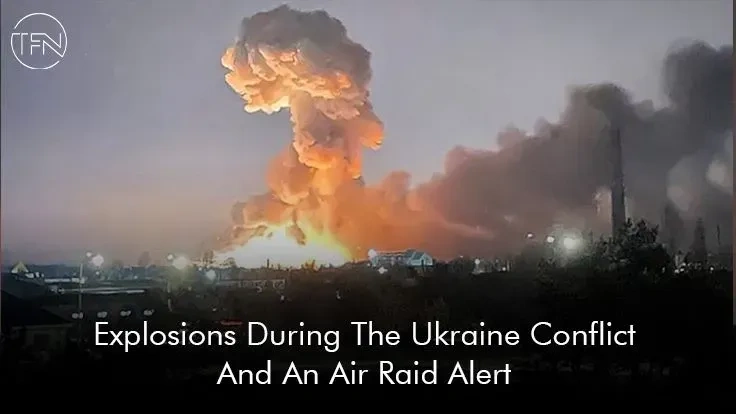
During a Russian raid on the capital city of Kyiv early on Wednesday morning, Ukrainian authorities claim to have shot down more than a dozen drones.
Large explosions were heard shortly after the air raid siren sounded, according to BBC journalists.
Explosions shook the Shevchenkovskiy area in the city's center when air defenses fired down drones that were allegedly produced in Iran.
Since October, Russia has routinely used missiles and drones to attack Ukraine's energy infrastructure.
Oleksiy Kuleba, the governor of Kyiv, also said that Russia was "continuing its energy terror against our nation" with the most recent drone assaults.
However, in a message to its Telegram account on Wednesday, the national electricity grid management company Ukrenergo claimed that no energy installations were harmed by the raids and praised the "great job of the air defense troops."
The Ukrainian military shot down all 13 Shahed drones fired by Russia on Wednesday, according to President Volodymyr Zelensky.
A drone fragment, according to Governor Kuleba, struck four residential structures and a municipal office. There have been no reports of injuries from the impact, a spokeswoman for the city's emergency services told Ukrainian media.
According to a witness called Svetlana, the first attack happened around 06:30 (04:30 GMT) local time.
She described the sound as being similar to that of a moped. An explosion and a loud boom followed it as it hit the ground behind the homes.
"What will people do when winter arrives?" she asked. What do they want from us, Lord? Ukrainians are not permitted to exist.
Another Kyiv homeowner named Anton told the BBC that the blasts' flying glass almost missed his sleeping children.
He said, "Let this Putin die. He treats me like that even though I didn't do anything to him."
After visiting the southern towns of Mykolaiv and Kherson, UN humanitarian head Martin Griffiths was in Kyiv when the attacks took place. He told the BBC that they served as a reminder that Ukraine was still suffering from the conflict all over the country, not just on the front lines.
The immediate requirement, according to Mr. Griffiths, was to assist Ukraine in re-establishing its energy supply, especially by giving the nation generators since "electricity is the entrance to life. If you don't have power, you can't stay warm, travel to the hospital for treatment, go to school, or have transportation."
Iran first denied providing Russia with the "kamikaze" drones used in the fatal assaults on October 17th, but Ukraine has since accused Iran of doing so.
Iran eventually said that "several months" before the conflict, a small number of drones were sent to Moscow.
In response, Ukraine's President Zelensky said that this was not true and that Iran had many more drones in operation.
Russia allegedly targeted the nation's electricity system in recent months to demoralize the populace, according to Ukraine. The country of Ukraine has experienced below-freezing temperatures, but according to Martin Griffiths, there are no signs that a significant number of Ukrainians are leaving their homes or their nation.
Even though the rest of the world has called the attacks on civilian infrastructure war crimes, Russian President Vladimir Putin defended them last week by saying they were a response to an explosion that happened on October 8 on a Russian bridge that leads to Crimea.
The attacks take place as news emerges that the US is getting ready to provide Ukraine access to its cutting-edge Patriot air defense system. The announcement might occur as soon as Thursday, senior defense sources told the news agency Reuters.
The system is one of the most cutting-edge in the world; however, it is often out of stock. Because of its long-range capabilities, it could knock down Russian missiles and drones before they get close to Ukrainian cities.
However, Patriot systems need a lot of staff to operate them, unlike Ukraine's current air defense systems, and it may take several months to educate Kyiv's military to utilize them successfully.
Any move to supply Ukraine with Patriot defenses would undoubtedly be seen as an escalation by Russia. Dmitry Medvedev, a former president who is now vice head of the national security council, issued a warning against the action last month.
In the meantime, Ukraine claims to have negotiated the release of 64 soldiers who were taken prisoner by Russia earlier this year during combat in the eastern Donbas area.
The chief of the office of President Zelensky, Andriy Yermak, also said that Suedi Murekezi, a citizen of the United States, had been freed.
During their July occupation of the southern city of Kherson, where Mr. Murekezi had been residing for more than two years, Russian forces detained him.
He was freed from a Russian prison in October, but Moscow's government told him he couldn't leave the Donetsk region because he didn't have any ID.

